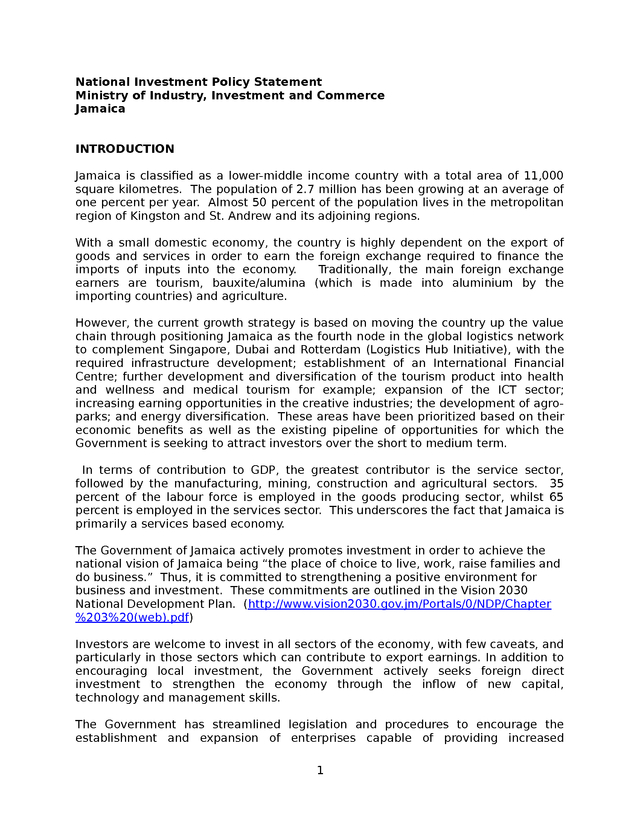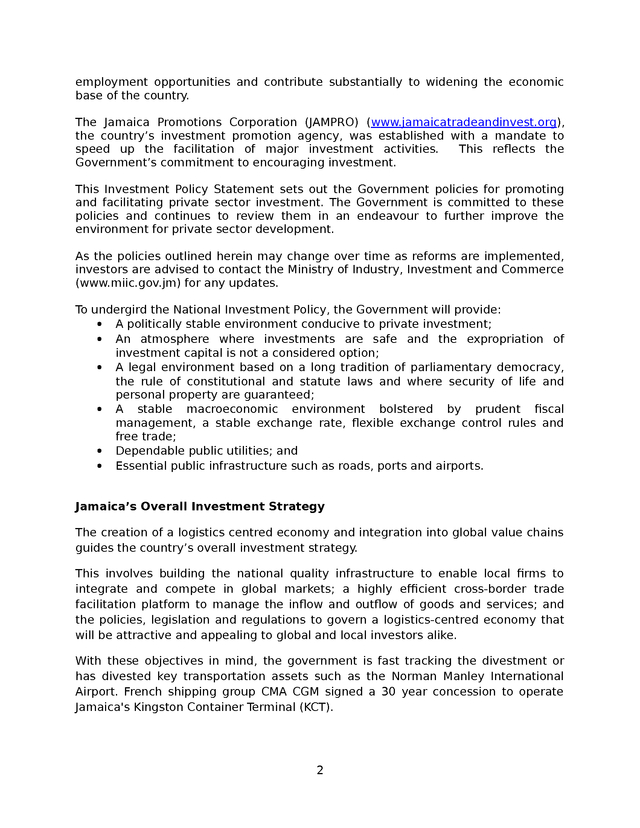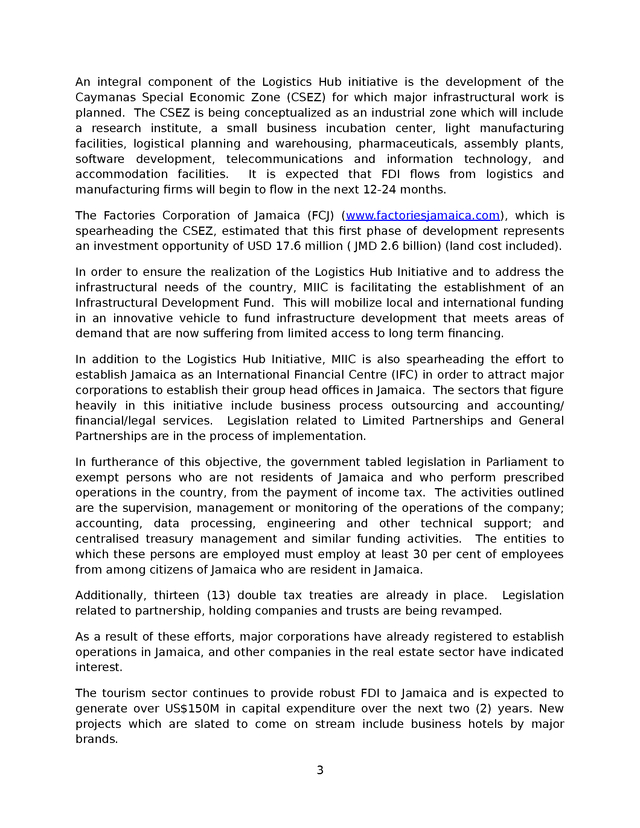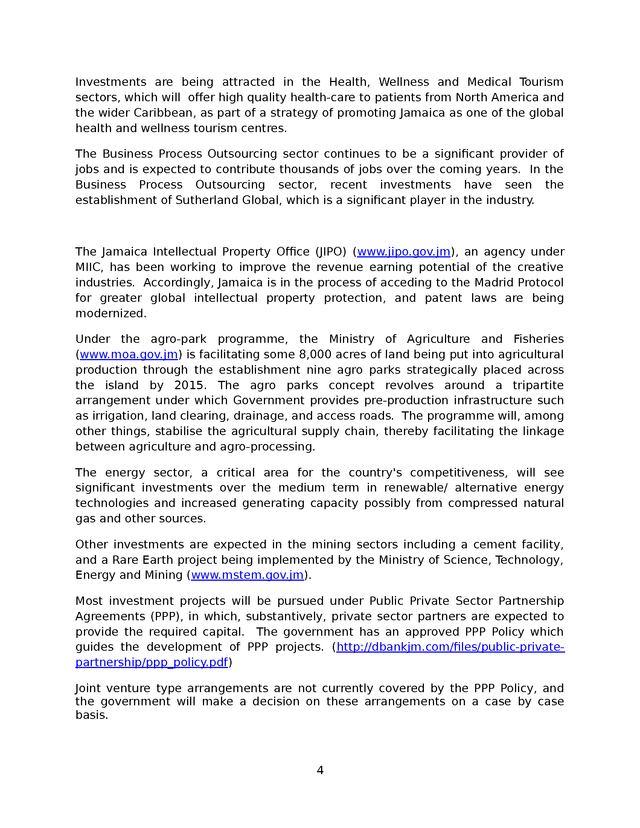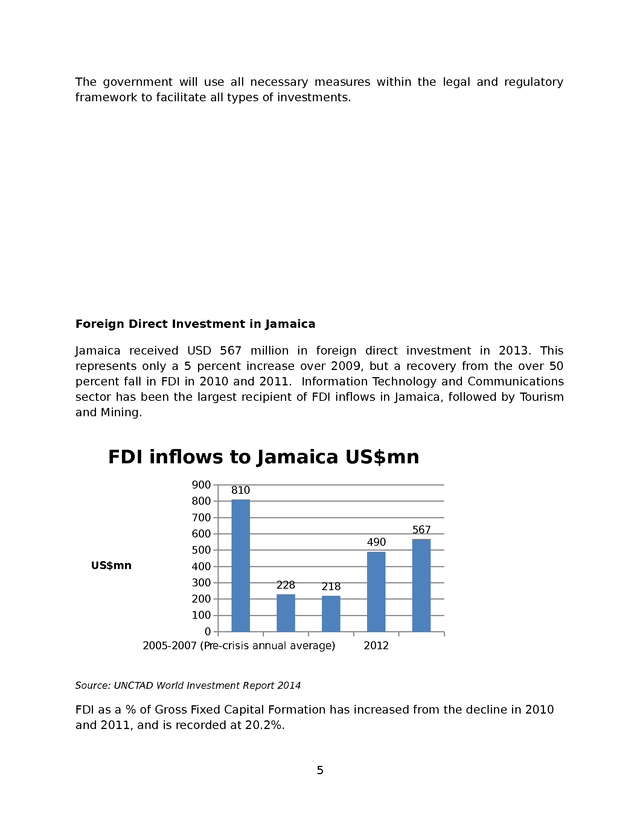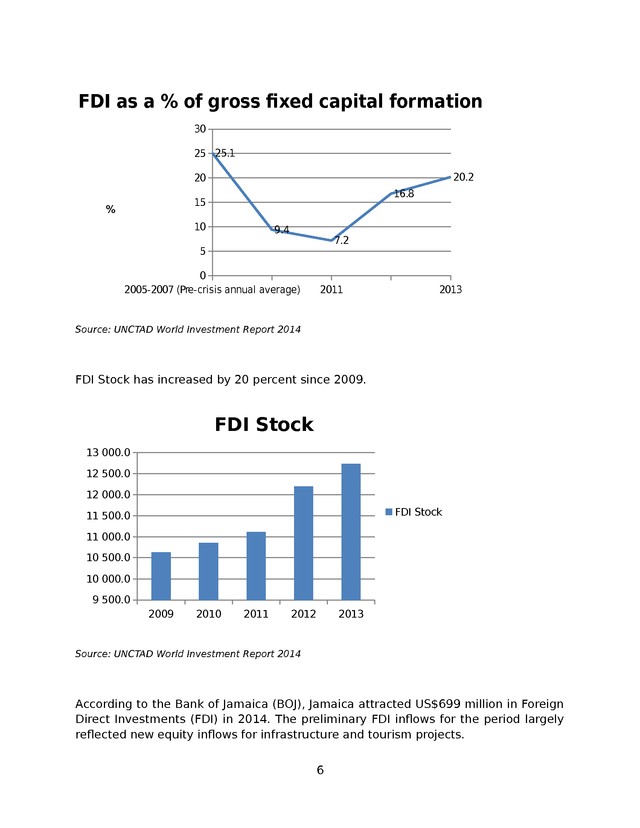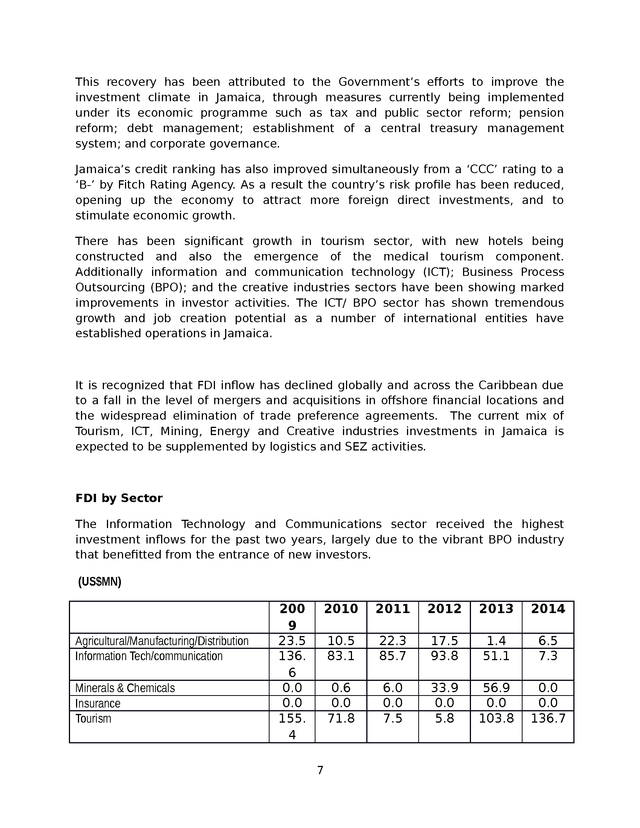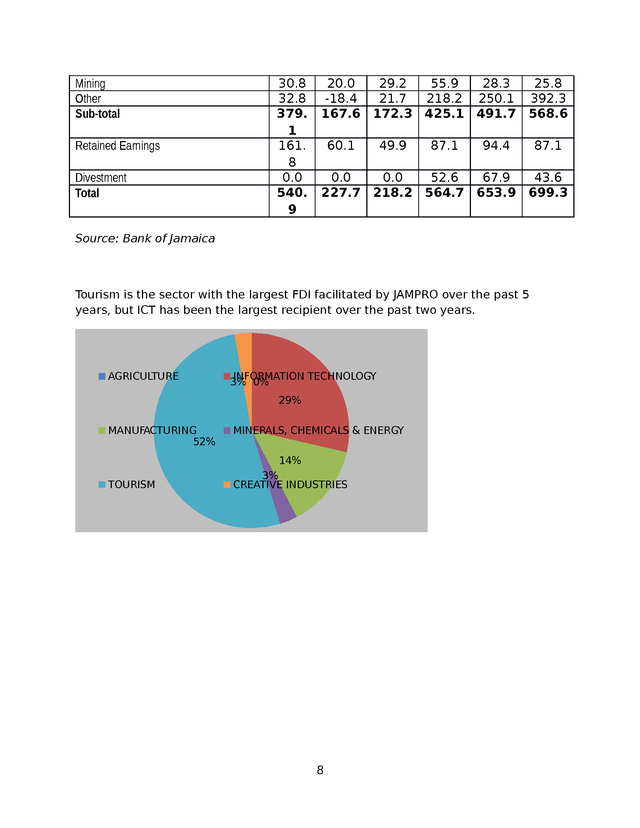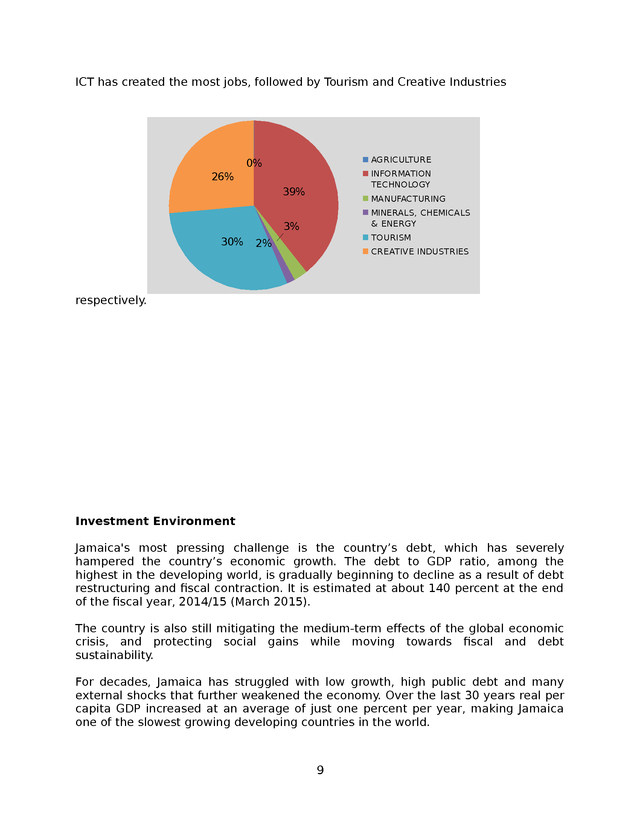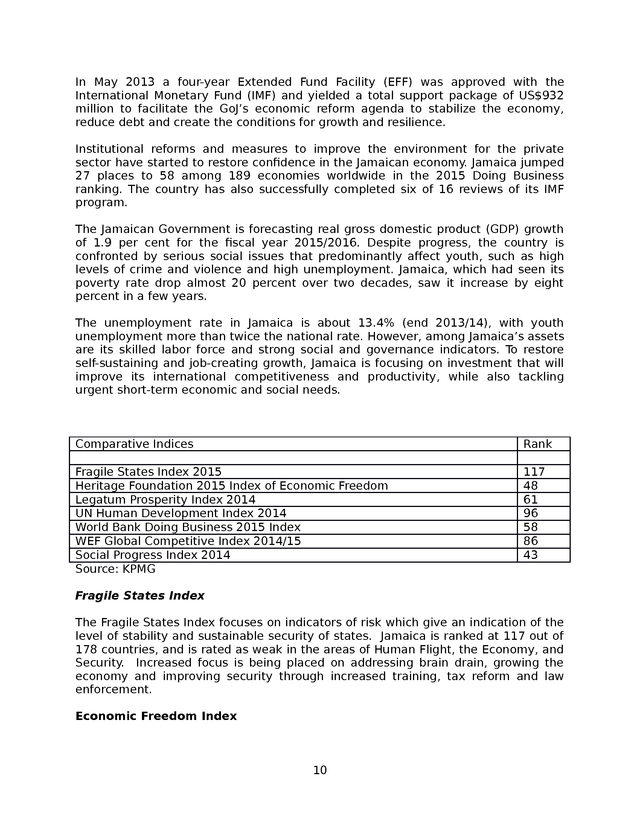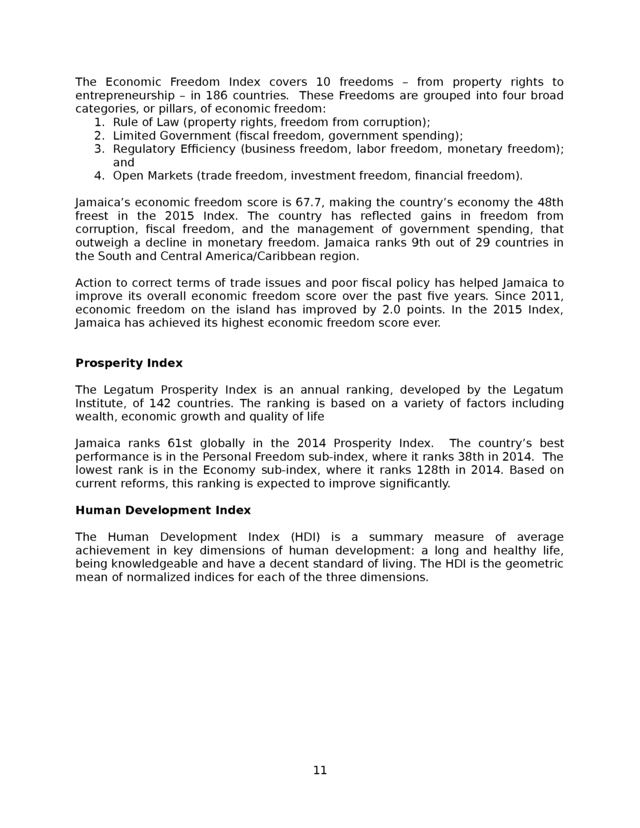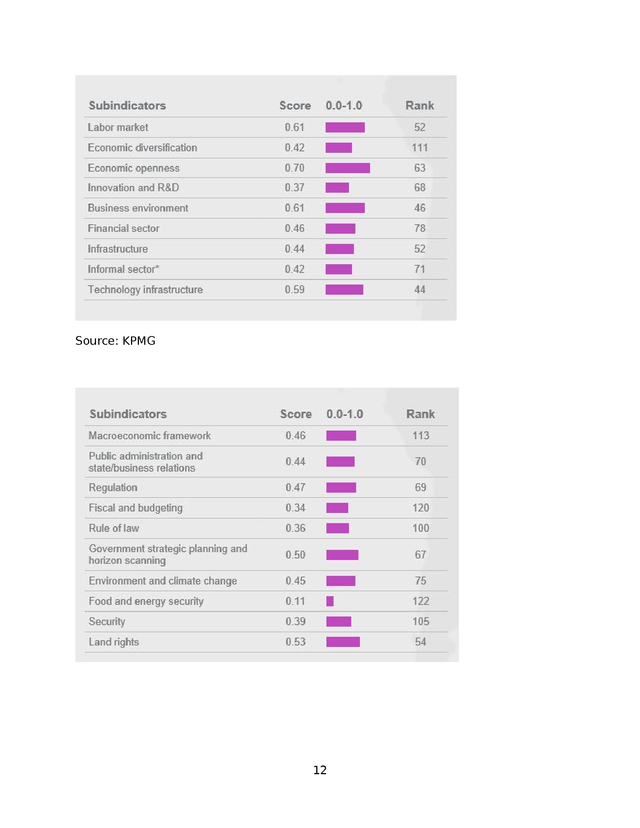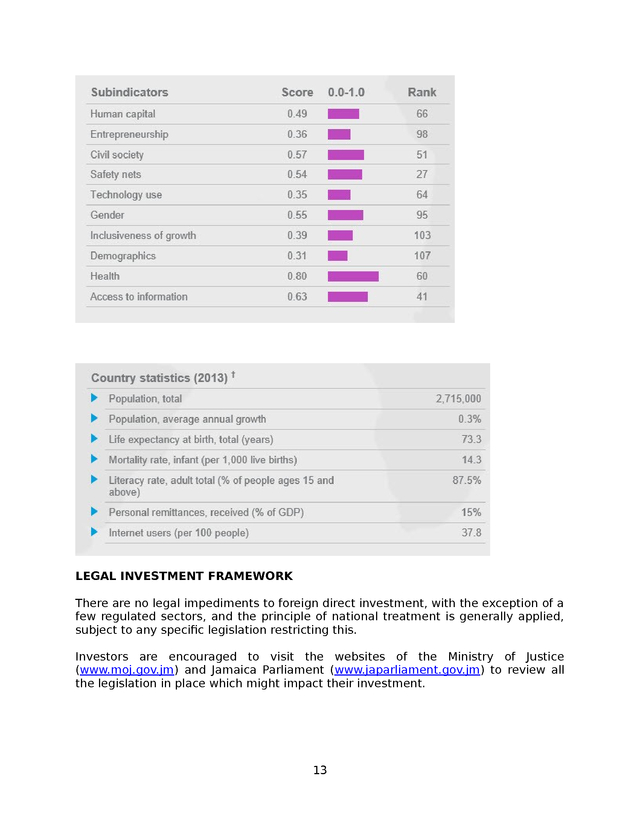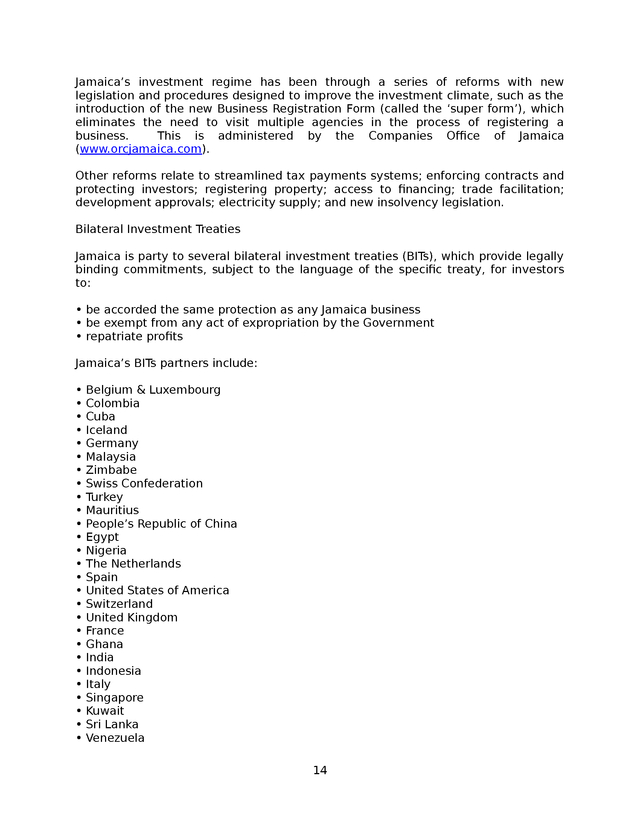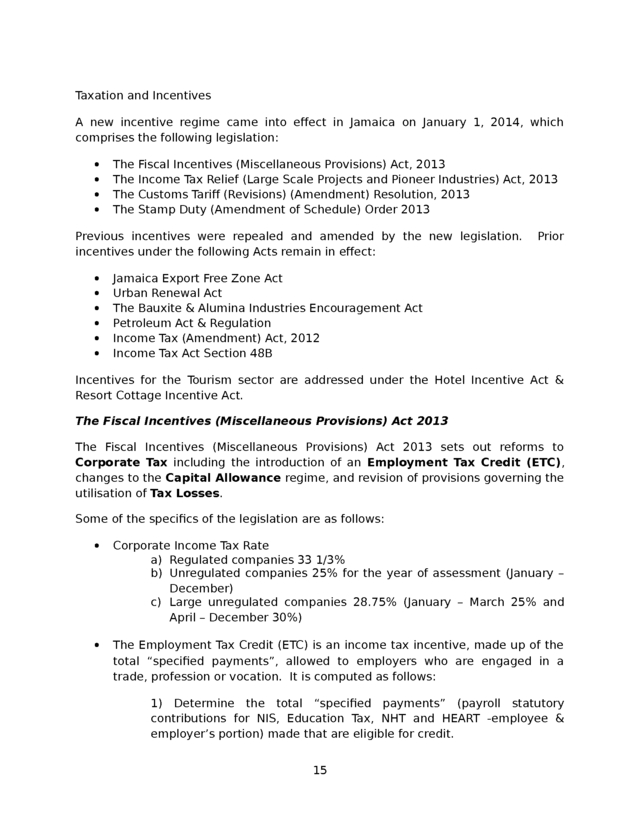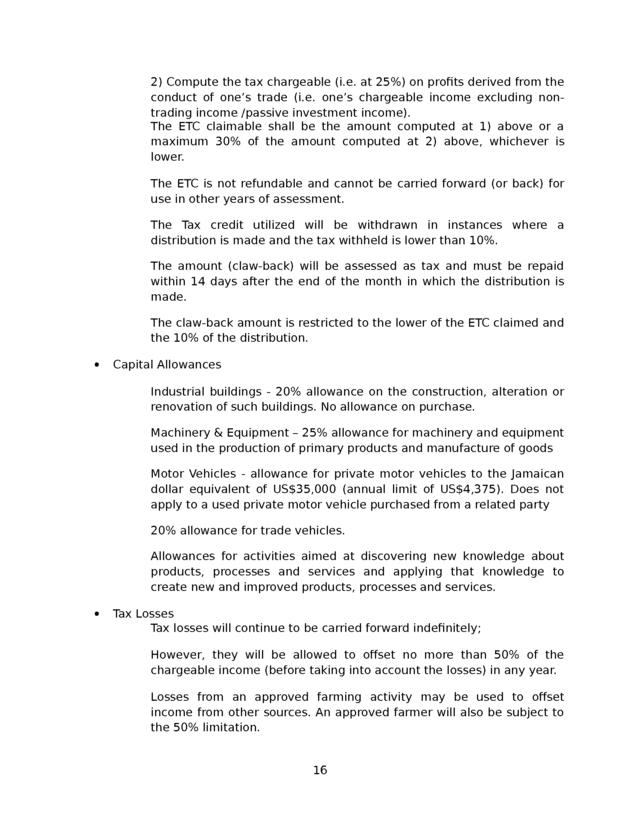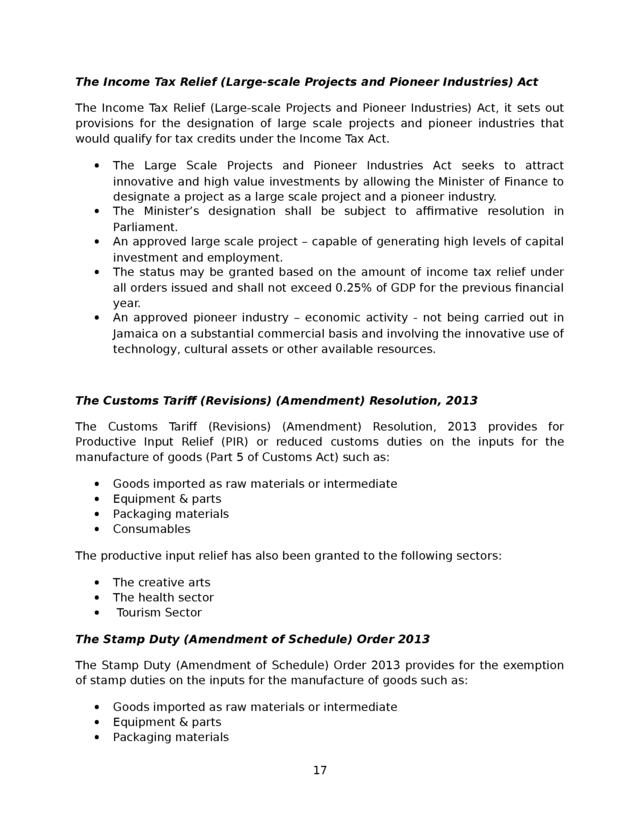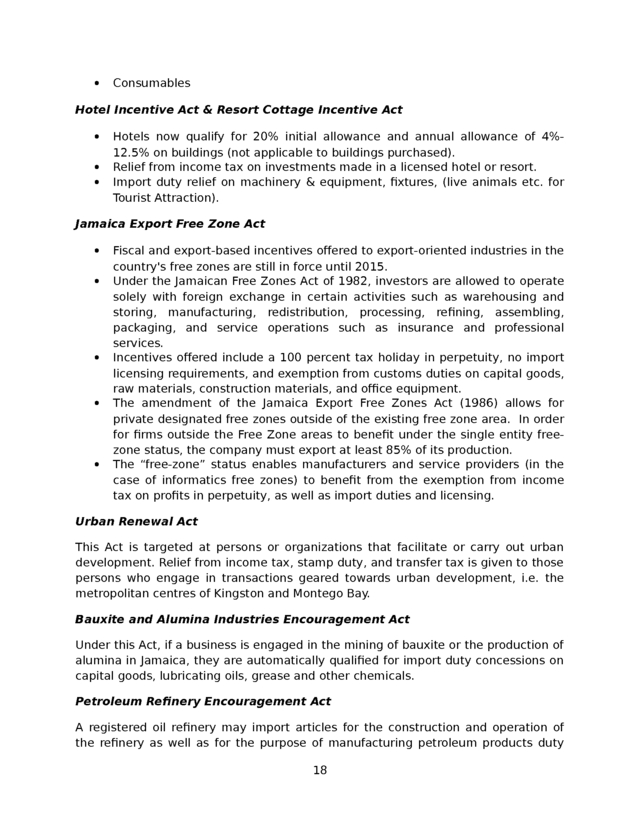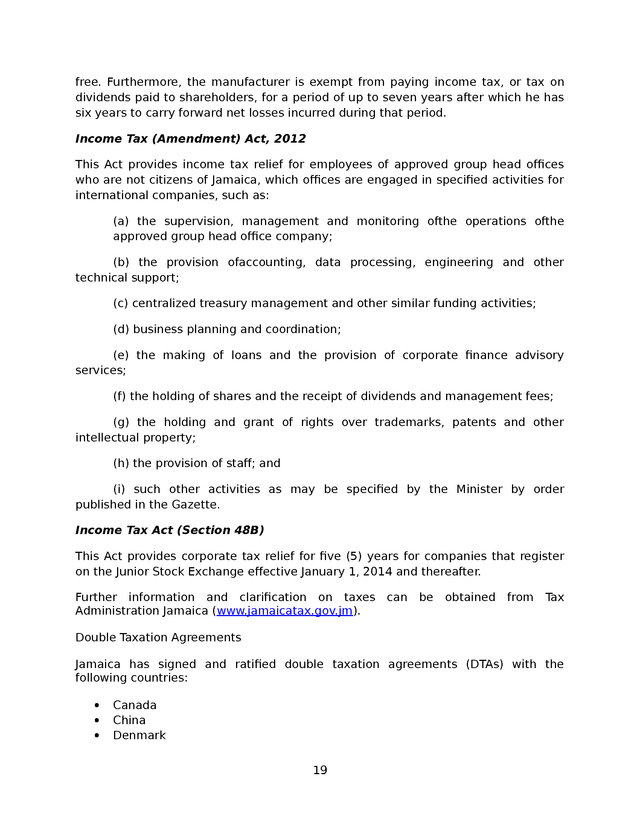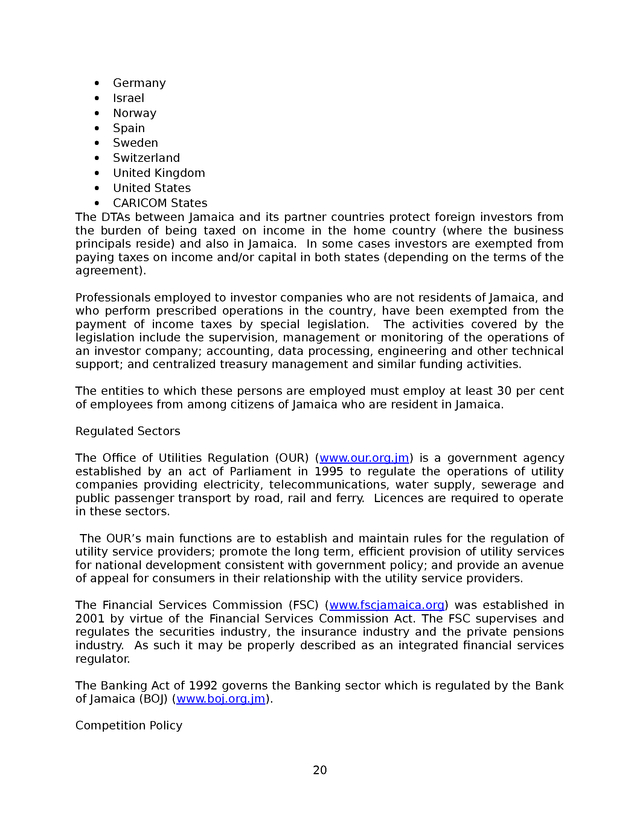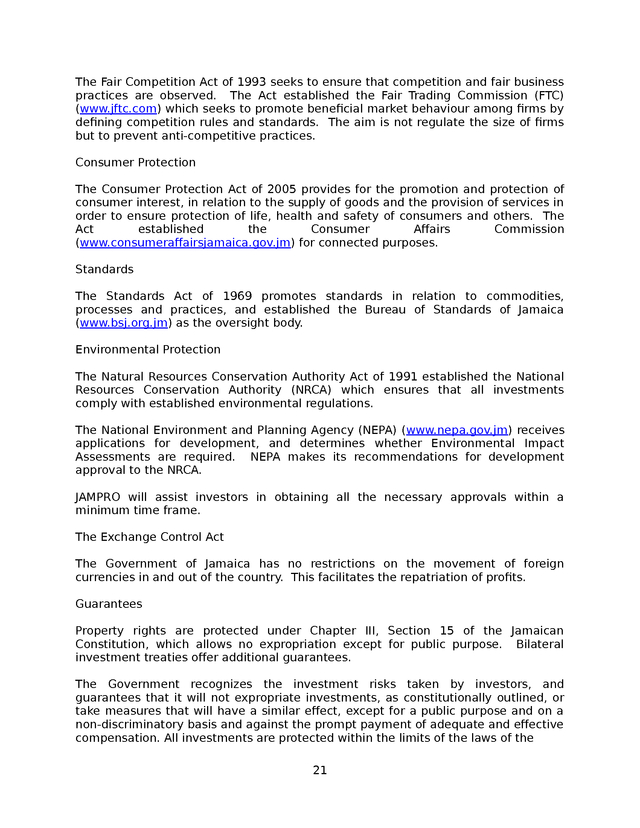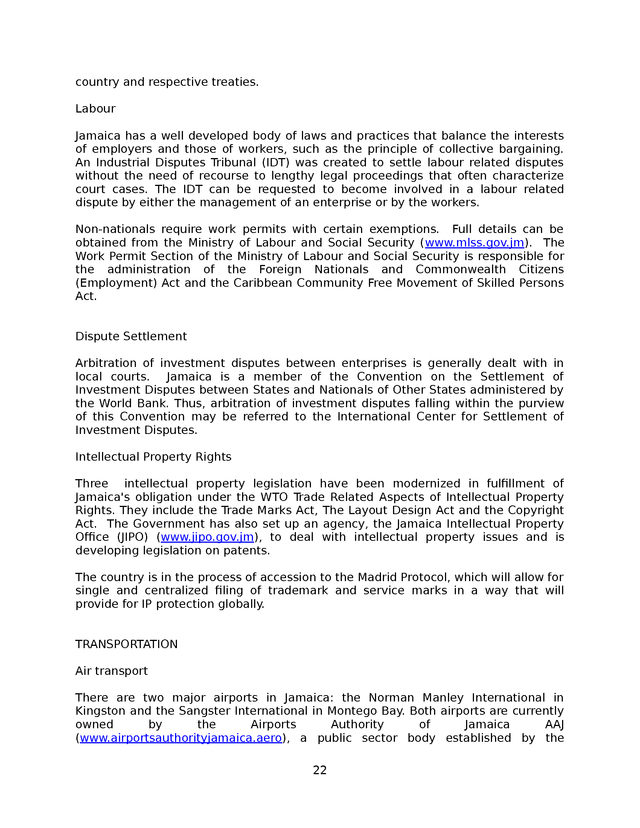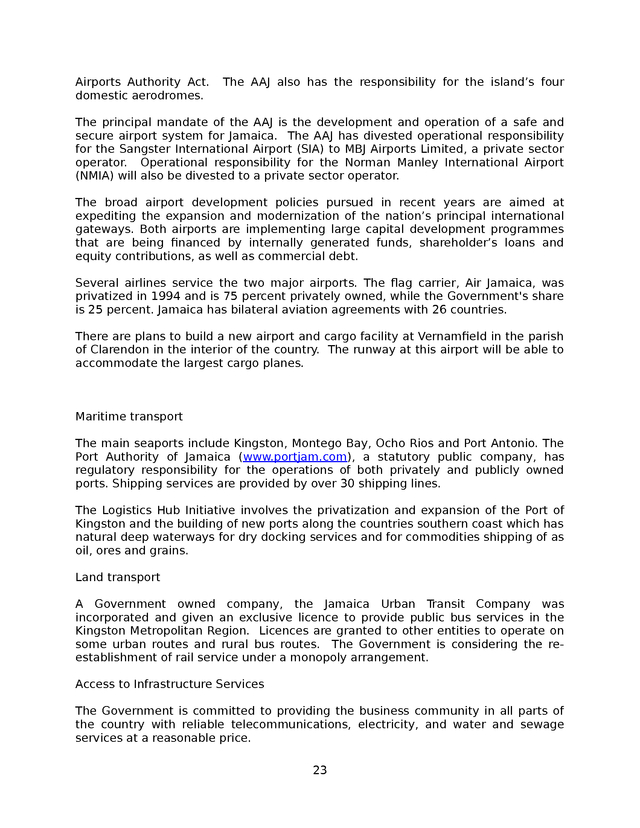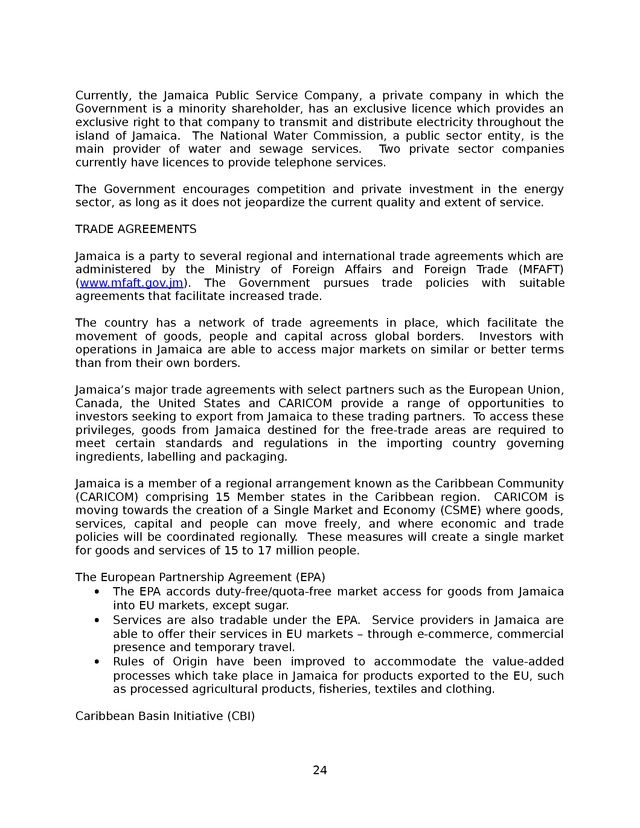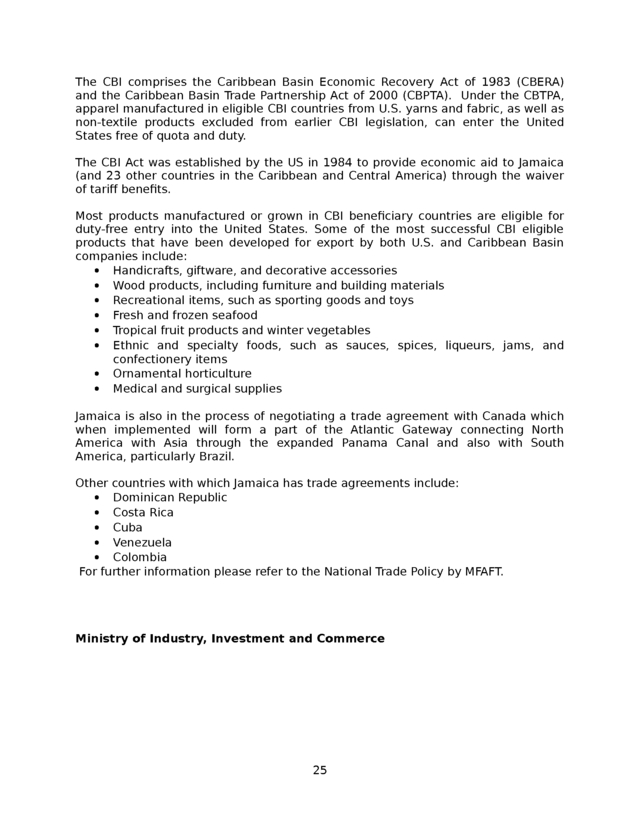




1) National Investment Policy Statement Ministry of Industry, Investment and Commerce Jamaica INTRODUCTION Jamaica is classified as a lower-middle income country with a total area of 11,000 square kilometres. The population of 2.7 million has been growing at an average of one percent per year. Almost 50 percent of the population lives in the metropolitan region of Kingston and St. Andrew and its adjoining regions. With a small domestic economy, the country is highly dependent on the export of goods and services in order to earn the foreign exchange required to finance the imports of inputs into the economy. Traditionally, the main foreign exchange earners are tourism, bauxite/alumina (which is made into aluminium by the importing countries) and agriculture. However, the current growth strategy is based on moving the country up the value chain through positioning Jamaica as the fourth node in the global logistics network to complement Singapore, Dubai and Rotterdam (Logistics Hub Initiative), with the required infrastructure development; establishment of an International Financial Centre; further development and diversification of the tourism product into health and wellness and medical tourism for example; expansion of the ICT sector; increasing earning opportunities in the creative industries; the development of agroparks; and energy diversification. These areas have been prioritized based on their economic benefits as well as the existing pipeline of opportunities for which the Government is seeking to attract investors over the short to medium term. In terms of contribution to GDP, the greatest contributor is the service sector, followed by the manufacturing, mining, construction and agricultural sectors. 35 percent of the labour force is employed in the goods producing sector, whilst 65 percent is employed in the services sector. This underscores the fact that Jamaica is primarily a services based economy. The Government of Jamaica actively promotes investment in order to achieve the national vision of Jamaica being “the place of choice to live, work, raise families and do business.” Thus, it is committed to strengthening a positive environment for business and investment. These commitments are outlined in the Vision 2030 National Development Plan. (http://www.vision2030.gov.jm/Portals/0/NDP/Chapter %203%20(web).pdf) Investors are welcome to invest in all sectors of the economy, with few caveats, and particularly in those sectors which can contribute to export earnings. In addition to encouraging local investment, the Government actively seeks foreign direct investment to strengthen the economy through the inflow of new capital, technology and management skills. The Government has streamlined legislation and procedures to encourage the establishment and expansion of enterprises capable of providing increased 1
2) employment opportunities and contribute substantially to widening the economic base of the country. The Jamaica Promotions Corporation (JAMPRO) (www.jamaicatradeandinvest.org), the country’s investment promotion agency, was established with a mandate to speed up the facilitation of major investment activities. This reflects the Government’s commitment to encouraging investment. This Investment Policy Statement sets out the Government policies for promoting and facilitating private sector investment. The Government is committed to these policies and continues to review them in an endeavour to further improve the environment for private sector development. As the policies outlined herein may change over time as reforms are implemented, investors are advised to contact the Ministry of Industry, Investment and Commerce (www.miic.gov.jm) for any updates. To undergird the National Investment Policy, the Government will provide: ï‚· A politically stable environment conducive to private investment; ï‚· An atmosphere where investments are safe and the expropriation of investment capital is not a considered option; ï‚· A legal environment based on a long tradition of parliamentary democracy, the rule of constitutional and statute laws and where security of life and personal property are guaranteed; ï‚· A stable macroeconomic environment bolstered by prudent fiscal management, a stable exchange rate, flexible exchange control rules and free trade; ï‚· Dependable public utilities; and ï‚· Essential public infrastructure such as roads, ports and airports. Jamaica’s Overall Investment Strategy The creation of a logistics centred economy and integration into global value chains guides the country’s overall investment strategy. This involves building the national quality infrastructure to enable local firms to integrate and compete in global markets; a highly efficient cross-border trade facilitation platform to manage the inflow and outflow of goods and services; and the policies, legislation and regulations to govern a logistics-centred economy that will be attractive and appealing to global and local investors alike. With these objectives in mind, the government is fast tracking the divestment or has divested key transportation assets such as the Norman Manley International Airport. French shipping group CMA CGM signed a 30 year concession to operate Jamaica's Kingston Container Terminal (KCT). 2
3) An integral component of the Logistics Hub initiative is the development of the Caymanas Special Economic Zone (CSEZ) for which major infrastructural work is planned. The CSEZ is being conceptualized as an industrial zone which will include a research institute, a small business incubation center, light manufacturing facilities, logistical planning and warehousing, pharmaceuticals, assembly plants, software development, telecommunications and information technology, and accommodation facilities. It is expected that FDI flows from logistics and manufacturing firms will begin to flow in the next 12-24 months. The Factories Corporation of Jamaica (FCJ) (www.factoriesjamaica.com), which is spearheading the CSEZ, estimated that this first phase of development represents an investment opportunity of USD 17.6 million ( JMD 2.6 billion) (land cost included). In order to ensure the realization of the Logistics Hub Initiative and to address the infrastructural needs of the country, MIIC is facilitating the establishment of an Infrastructural Development Fund. This will mobilize local and international funding in an innovative vehicle to fund infrastructure development that meets areas of demand that are now suffering from limited access to long term financing. In addition to the Logistics Hub Initiative, MIIC is also spearheading the effort to establish Jamaica as an International Financial Centre (IFC) in order to attract major corporations to establish their group head offices in Jamaica. The sectors that figure heavily in this initiative include business process outsourcing and accounting/ financial/legal services. Legislation related to Limited Partnerships and General Partnerships are in the process of implementation. In furtherance of this objective, the government tabled legislation in Parliament to exempt persons who are not residents of Jamaica and who perform prescribed operations in the country, from the payment of income tax. The activities outlined are the supervision, management or monitoring of the operations of the company; accounting, data processing, engineering and other technical support; and centralised treasury management and similar funding activities. The entities to which these persons are employed must employ at least 30 per cent of employees from among citizens of Jamaica who are resident in Jamaica. Additionally, thirteen (13) double tax treaties are already in place. Legislation related to partnership, holding companies and trusts are being revamped. As a result of these efforts, major corporations have already registered to establish operations in Jamaica, and other companies in the real estate sector have indicated interest. The tourism sector continues to provide robust FDI to Jamaica and is expected to generate over US$150M in capital expenditure over the next two (2) years. New projects which are slated to come on stream include business hotels by major brands. 3
4) Investments are being attracted in the Health, Wellness and Medical Tourism sectors, which will offer high quality health-care to patients from North America and the wider Caribbean, as part of a strategy of promoting Jamaica as one of the global health and wellness tourism centres. The Business Process Outsourcing sector continues to be a significant provider of jobs and is expected to contribute thousands of jobs over the coming years. In the Business Process Outsourcing sector, recent investments have seen the establishment of Sutherland Global, which is a significant player in the industry. The Jamaica Intellectual Property Office (JIPO) (www.jipo.gov.jm), an agency under MIIC, has been working to improve the revenue earning potential of the creative industries. Accordingly, Jamaica is in the process of acceding to the Madrid Protocol for greater global intellectual property protection, and patent laws are being modernized. Under the agro-park programme, the Ministry of Agriculture and Fisheries (www.moa.gov.jm) is facilitating some 8,000 acres of land being put into agricultural production through the establishment nine agro parks strategically placed across the island by 2015. The agro parks concept revolves around a tripartite arrangement under which Government provides pre-production infrastructure such as irrigation, land clearing, drainage, and access roads. The programme will, among other things, stabilise the agricultural supply chain, thereby facilitating the linkage between agriculture and agro-processing. The energy sector, a critical area for the country's competitiveness, will see significant investments over the medium term in renewable/ alternative energy technologies and increased generating capacity possibly from compressed natural gas and other sources. Other investments are expected in the mining sectors including a cement facility, and a Rare Earth project being implemented by the Ministry of Science, Technology, Energy and Mining (www.mstem.gov.jm). Most investment projects will be pursued under Public Private Sector Partnership Agreements (PPP), in which, substantively, private sector partners are expected to provide the required capital. The government has an approved PPP Policy which guides the development of PPP projects. (http://dbankjm.com/files/public-privatepartnership/ppp_policy.pdf) Joint venture type arrangements are not currently covered by the PPP Policy, and the government will make a decision on these arrangements on a case by case basis. 4
5) The government will use all necessary measures within the legal and regulatory framework to facilitate all types of investments. Foreign Direct Investment in Jamaica Jamaica received USD 567 million in foreign direct investment in 2013. This represents only a 5 percent increase over 2009, but a recovery from the over 50 percent fall in FDI in 2010 and 2011. Information Technology and Communications sector has been the largest recipient of FDI inflows in Jamaica, followed by Tourism and Mining. FDI inflows to Jamaica US$mn 900 800 810 700 567 600 490 500 US$mn 400 300 228 218 200 100 0 2005-2007 (Pre-crisis annual average) 2012 Source: UNCTAD World Investment Report 2014 FDI as a % of Gross Fixed Capital Formation has increased from the decline in 2010 and 2011, and is recorded at 20.2%. 5
6) FDI as a % of gross fixed capital formation 30 25 25.1 20.2 20 16.8 15 % 10 9.4 7.2 5 0 2005-2007 (Pre-crisis annual average) 2011 2013 Source: UNCTAD World Investment Report 2014 FDI Stock has increased by 20 percent since 2009. FDI Stock 13 000.0 12 500.0 12 000.0 FDI Stock 11 500.0 11 000.0 10 500.0 10 000.0 9 500.0 2009 2010 2011 2012 2013 Source: UNCTAD World Investment Report 2014 According to the Bank of Jamaica (BOJ), Jamaica attracted US$699 million in Foreign Direct Investments (FDI) in 2014. The preliminary FDI inflows for the period largely reflected new equity inflows for infrastructure and tourism projects. 6
7) This recovery has been attributed to the Government’s efforts to improve the investment climate in Jamaica, through measures currently being implemented under its economic programme such as tax and public sector reform; pension reform; debt management; establishment of a central treasury management system; and corporate governance. Jamaica’s credit ranking has also improved simultaneously from a ‘CCC’ rating to a ‘B-’ by Fitch Rating Agency. As a result the country’s risk profile has been reduced, opening up the economy to attract more foreign direct investments, and to stimulate economic growth. There has been significant growth in tourism sector, with new hotels being constructed and also the emergence of the medical tourism component. Additionally information and communication technology (ICT); Business Process Outsourcing (BPO); and the creative industries sectors have been showing marked improvements in investor activities. The ICT/ BPO sector has shown tremendous growth and job creation potential as a number of international entities have established operations in Jamaica. It is recognized that FDI inflow has declined globally and across the Caribbean due to a fall in the level of mergers and acquisitions in offshore financial locations and the widespread elimination of trade preference agreements. The current mix of Tourism, ICT, Mining, Energy and Creative industries investments in Jamaica is expected to be supplemented by logistics and SEZ activities. FDI by Sector The Information Technology and Communications sector received the highest investment inflows for the past two years, largely due to the vibrant BPO industry that benefitted from the entrance of new investors. (US$MN) Agricultural/Manufacturing/Distribution Information Tech/communication Minerals & Chemicals Insurance Tourism 200 9 23.5 136. 6 0.0 0.0 155. 4 2010 2011 2012 2013 2014 10.5 83.1 22.3 85.7 17.5 93.8 1.4 51.1 6.5 7.3 0.6 0.0 71.8 6.0 0.0 7.5 33.9 0.0 5.8 56.9 0.0 103.8 0.0 0.0 136.7 7
8) Mining Other Sub-total Retained Earnings Divestment Total 30.8 32.8 379. 1 161. 8 0.0 540. 9 20.0 29.2 55.9 28.3 25.8 -18.4 21.7 218.2 250.1 392.3 167.6 172.3 425.1 491.7 568.6 60.1 49.9 87.1 94.4 0.0 0.0 52.6 67.9 43.6 227.7 218.2 564.7 653.9 699.3 Source: Bank of Jamaica Tourism is the sector with the largest FDI facilitated by JAMPRO over the past 5 years, but ICT has been the largest recipient over the past two years. AGRICULTURE INFORMATION TECHNOLOGY 3% 0% 29% MANUF ACTURING 52% MINERALS, CHEMICALS & ENERGY 14% TOURISM 87.1 3% CREATIVE INDUSTRIES 8
9) ICT has created the most jobs, followed by Tourism and Creative Industries AGRICULTURE 0% INFORMATION TECHNOLOGY 26% 39% MANUFACTURING MINERALS, CHEMICALS & ENERGY 3% 30% TOURISM 2% CREATIVE INDUSTRIES respectively. Investment Environment Jamaica's most pressing challenge is the country’s debt, which has severely hampered the country’s economic growth. The debt to GDP ratio, among the highest in the developing world, is gradually beginning to decline as a result of debt restructuring and fiscal contraction. It is estimated at about 140 percent at the end of the fiscal year, 2014/15 (March 2015). The country is also still mitigating the medium-term effects of the global economic crisis, and protecting social gains while moving towards fiscal and debt sustainability. For decades, Jamaica has struggled with low growth, high public debt and many external shocks that further weakened the economy. Over the last 30 years real per capita GDP increased at an average of just one percent per year, making Jamaica one of the slowest growing developing countries in the world. 9
10) In May 2013 a four-year Extended Fund Facility (EFF) was approved with the International Monetary Fund (IMF) and yielded a total support package of US$932 million to facilitate the GoJ’s economic reform agenda to stabilize the economy, reduce debt and create the conditions for growth and resilience. Institutional reforms and measures to improve the environment for the private sector have started to restore confidence in the Jamaican economy. Jamaica jumped 27 places to 58 among 189 economies worldwide in the 2015 Doing Business ranking. The country has also successfully completed six of 16 reviews of its IMF program. The Jamaican Government is forecasting real gross domestic product (GDP) growth of 1.9 per cent for the fiscal year 2015/2016. Despite progress, the country is confronted by serious social issues that predominantly affect youth, such as high levels of crime and violence and high unemployment. Jamaica, which had seen its poverty rate drop almost 20 percent over two decades, saw it increase by eight percent in a few years. The unemployment rate in Jamaica is about 13.4% (end 2013/14), with youth unemployment more than twice the national rate. However, among Jamaica’s assets are its skilled labor force and strong social and governance indicators. To restore self-sustaining and job-creating growth, Jamaica is focusing on investment that will improve its international competitiveness and productivity, while also tackling urgent short-term economic and social needs. Comparative Indices Rank Fragile States Index 2015 Heritage Foundation 2015 Index of Economic Freedom Legatum Prosperity Index 2014 UN Human Development Index 2014 World Bank Doing Business 2015 Index WEF Global Competitive Index 2014/15 Social Progress Index 2014 Source: KPMG 117 48 61 96 58 86 43 Fragile States Index The Fragile States Index focuses on indicators of risk which give an indication of the level of stability and sustainable security of states. Jamaica is ranked at 117 out of 178 countries, and is rated as weak in the areas of Human Flight, the Economy, and Security. Increased focus is being placed on addressing brain drain, growing the economy and improving security through increased training, tax reform and law enforcement. Economic Freedom Index 10
11) The Economic Freedom Index covers 10 freedoms – from property rights to entrepreneurship – in 186 countries. These Freedoms are grouped into four broad categories, or pillars, of economic freedom: 1. Rule of Law (property rights, freedom from corruption); 2. Limited Government (fiscal freedom, government spending); 3. Regulatory Efficiency (business freedom, labor freedom, monetary freedom); and 4. Open Markets (trade freedom, investment freedom, financial freedom). Jamaica’s economic freedom score is 67.7, making the country’s economy the 48th freest in the 2015 Index. The country has reflected gains in freedom from corruption, fiscal freedom, and the management of government spending, that outweigh a decline in monetary freedom. Jamaica ranks 9th out of 29 countries in the South and Central America/Caribbean region. Action to correct terms of trade issues and poor fiscal policy has helped Jamaica to improve its overall economic freedom score over the past five years. Since 2011, economic freedom on the island has improved by 2.0 points. In the 2015 Index, Jamaica has achieved its highest economic freedom score ever. Prosperity Index The Legatum Prosperity Index is an annual ranking, developed by the Legatum Institute, of 142 countries. The ranking is based on a variety of factors including wealth, economic growth and quality of life Jamaica ranks 61st globally in the 2014 Prosperity Index. The country’s best performance is in the Personal Freedom sub-index, where it ranks 38th in 2014. The lowest rank is in the Economy sub-index, where it ranks 128th in 2014. Based on current reforms, this ranking is expected to improve significantly. Human Development Index The Human Development Index (HDI) is a summary measure of average achievement in key dimensions of human development: a long and healthy life, being knowledgeable and have a decent standard of living. The HDI is the geometric mean of normalized indices for each of the three dimensions. 11
12) Source: KPMG 12
13) LEGAL INVESTMENT FRAMEWORK There are no legal impediments to foreign direct investment, with the exception of a few regulated sectors, and the principle of national treatment is generally applied, subject to any specific legislation restricting this. Investors are encouraged to visit the websites of the Ministry of Justice (www.moj.gov.jm) and Jamaica Parliament (www.japarliament.gov.jm) to review all the legislation in place which might impact their investment. 13
14) Jamaica’s investment regime has been through a series of reforms with new legislation and procedures designed to improve the investment climate, such as the introduction of the new Business Registration Form (called the ‘super form’), which eliminates the need to visit multiple agencies in the process of registering a business. This is administered by the Companies Office of Jamaica (www.orcjamaica.com). Other reforms relate to streamlined tax payments systems; enforcing contracts and protecting investors; registering property; access to financing; trade facilitation; development approvals; electricity supply; and new insolvency legislation. Bilateral Investment Treaties Jamaica is party to several bilateral investment treaties (BITs), which provide legally binding commitments, subject to the language of the specific treaty, for investors to: • be accorded the same protection as any Jamaica business • be exempt from any act of expropriation by the Government • repatriate profits Jamaica’s BITs partners include: • • • • • • • • • • • • • • • • • • • • • • • • • • • Belgium & Luxembourg Colombia Cuba Iceland Germany Malaysia Zimbabe Swiss Confederation Turkey Mauritius People’s Republic of China Egypt Nigeria The Netherlands Spain United States of America Switzerland United Kingdom France Ghana India Indonesia Italy Singapore Kuwait Sri Lanka Venezuela 14
15) Taxation and Incentives A new incentive regime came into effect in Jamaica on January 1, 2014, which comprises the following legislation: ï‚· ï‚· ï‚· ï‚· The The The The Fiscal Incentives (Miscellaneous Provisions) Act, 2013 Income Tax Relief (Large Scale Projects and Pioneer Industries) Act, 2013 Customs Tariff (Revisions) (Amendment) Resolution, 2013 Stamp Duty (Amendment of Schedule) Order 2013 Previous incentives were repealed and amended by the new legislation. incentives under the following Acts remain in effect: ï‚· ï‚· ï‚· ï‚· ï‚· ï‚· Prior Jamaica Export Free Zone Act Urban Renewal Act The Bauxite & Alumina Industries Encouragement Act Petroleum Act & Regulation Income Tax (Amendment) Act, 2012 Income Tax Act Section 48B Incentives for the Tourism sector are addressed under the Hotel Incentive Act & Resort Cottage Incentive Act. The Fiscal Incentives (Miscellaneous Provisions) Act 2013 The Fiscal Incentives (Miscellaneous Provisions) Act 2013 sets out reforms to Corporate Tax including the introduction of an Employment Tax Credit (ETC), changes to the Capital Allowance regime, and revision of provisions governing the utilisation of Tax Losses. Some of the specifics of the legislation are as follows: ï‚· Corporate Income Tax Rate a) Regulated companies 33 1/3% b) Unregulated companies 25% for the year of assessment (January – December) c) Large unregulated companies 28.75% (January – March 25% and April – December 30%) ï‚· The Employment Tax Credit (ETC) is an income tax incentive, made up of the total “specified payments”, allowed to employers who are engaged in a trade, profession or vocation. It is computed as follows: 1) Determine the total “specified payments” (payroll statutory contributions for NIS, Education Tax, NHT and HEART -employee & employer’s portion) made that are eligible for credit. 15
16) 2) Compute the tax chargeable (i.e. at 25%) on profits derived from the conduct of one’s trade (i.e. one’s chargeable income excluding nontrading income /passive investment income). The ETC claimable shall be the amount computed at 1) above or a maximum 30% of the amount computed at 2) above, whichever is lower. The ETC is not refundable and cannot be carried forward (or back) for use in other years of assessment. The Tax credit utilized will be withdrawn in instances where a distribution is made and the tax withheld is lower than 10%. The amount (claw-back) will be assessed as tax and must be repaid within 14 days after the end of the month in which the distribution is made. The claw-back amount is restricted to the lower of the ETC claimed and the 10% of the distribution. ï‚· Capital Allowances Industrial buildings - 20% allowance on the construction, alteration or renovation of such buildings. No allowance on purchase. Machinery & Equipment – 25% allowance for machinery and equipment used in the production of primary products and manufacture of goods Motor Vehicles - allowance for private motor vehicles to the Jamaican dollar equivalent of US$35,000 (annual limit of US$4,375). Does not apply to a used private motor vehicle purchased from a related party 20% allowance for trade vehicles. Allowances for activities aimed at discovering new knowledge about products, processes and services and applying that knowledge to create new and improved products, processes and services. ï‚· Tax Losses Tax losses will continue to be carried forward indefinitely; However, they will be allowed to offset no more than 50% of the chargeable income (before taking into account the losses) in any year. Losses from an approved farming activity may be used to offset income from other sources. An approved farmer will also be subject to the 50% limitation. 16
17) The Income Tax Relief (Large-scale Projects and Pioneer Industries) Act The Income Tax Relief (Large-scale Projects and Pioneer Industries) Act, it sets out provisions for the designation of large scale projects and pioneer industries that would qualify for tax credits under the Income Tax Act. ï‚· ï‚· ï‚· ï‚· ï‚· The Large Scale Projects and Pioneer Industries Act seeks to attract innovative and high value investments by allowing the Minister of Finance to designate a project as a large scale project and a pioneer industry. The Minister’s designation shall be subject to affirmative resolution in Parliament. An approved large scale project – capable of generating high levels of capital investment and employment. The status may be granted based on the amount of income tax relief under all orders issued and shall not exceed 0.25% of GDP for the previous financial year. An approved pioneer industry – economic activity - not being carried out in Jamaica on a substantial commercial basis and involving the innovative use of technology, cultural assets or other available resources. The Customs Tariff (Revisions) (Amendment) Resolution, 2013 The Customs Tariff (Revisions) (Amendment) Resolution, 2013 provides for Productive Input Relief (PIR) or reduced customs duties on the inputs for the manufacture of goods (Part 5 of Customs Act) such as: ï‚· ï‚· ï‚· ï‚· Goods imported as raw materials or intermediate Equipment & parts Packaging materials Consumables The productive input relief has also been granted to the following sectors: ï‚· ï‚· ï‚· The creative arts The health sector Tourism Sector The Stamp Duty (Amendment of Schedule) Order 2013 The Stamp Duty (Amendment of Schedule) Order 2013 provides for the exemption of stamp duties on the inputs for the manufacture of goods such as: ï‚· ï‚· ï‚· Goods imported as raw materials or intermediate Equipment & parts Packaging materials 17
18) ï‚· Consumables Hotel Incentive Act & Resort Cottage Incentive Act ï‚· ï‚· ï‚· Hotels now qualify for 20% initial allowance and annual allowance of 4%12.5% on buildings (not applicable to buildings purchased). Relief from income tax on investments made in a licensed hotel or resort. Import duty relief on machinery & equipment, fixtures, (live animals etc. for Tourist Attraction). Jamaica Export Free Zone Act ï‚· ï‚· ï‚· ï‚· ï‚· Fiscal and export-based incentives offered to export-oriented industries in the country's free zones are still in force until 2015. Under the Jamaican Free Zones Act of 1982, investors are allowed to operate solely with foreign exchange in certain activities such as warehousing and storing, manufacturing, redistribution, processing, refining, assembling, packaging, and service operations such as insurance and professional services. Incentives offered include a 100 percent tax holiday in perpetuity, no import licensing requirements, and exemption from customs duties on capital goods, raw materials, construction materials, and office equipment. The amendment of the Jamaica Export Free Zones Act (1986) allows for private designated free zones outside of the existing free zone area. In order for firms outside the Free Zone areas to benefit under the single entity freezone status, the company must export at least 85% of its production. The “free-zone” status enables manufacturers and service providers (in the case of informatics free zones) to benefit from the exemption from income tax on profits in perpetuity, as well as import duties and licensing. Urban Renewal Act This Act is targeted at persons or organizations that facilitate or carry out urban development. Relief from income tax, stamp duty, and transfer tax is given to those persons who engage in transactions geared towards urban development, i.e. the metropolitan centres of Kingston and Montego Bay. Bauxite and Alumina Industries Encouragement Act Under this Act, if a business is engaged in the mining of bauxite or the production of alumina in Jamaica, they are automatically qualified for import duty concessions on capital goods, lubricating oils, grease and other chemicals. Petroleum Refinery Encouragement Act A registered oil refinery may import articles for the construction and operation of the refinery as well as for the purpose of manufacturing petroleum products duty 18
19) free. Furthermore, the manufacturer is exempt from paying income tax, or tax on dividends paid to shareholders, for a period of up to seven years after which he has six years to carry forward net losses incurred during that period. Income Tax (Amendment) Act, 2012 This Act provides income tax relief for employees of approved group head offices who are not citizens of Jamaica, which offices are engaged in specified activities for international companies, such as: (a) the supervision, management and monitoring ofthe operations ofthe approved group head office company; (b) the provision ofaccounting, data processing, engineering and other technical support; (c) centralized treasury management and other similar funding activities; (d) business planning and coordination; (e) the making of loans and the provision of corporate finance advisory services; (f) the holding of shares and the receipt of dividends and management fees; (g) the holding and grant of rights over trademarks, patents and other intellectual property; (h) the provision of staff; and (i) such other activities as may be specified by the Minister by order published in the Gazette. Income Tax Act (Section 48B) This Act provides corporate tax relief for five (5) years for companies that register on the Junior Stock Exchange effective January 1, 2014 and thereafter. Further information and clarification on taxes Administration Jamaica (www.jamaicatax.gov.jm). can be obtained from Tax Double Taxation Agreements Jamaica has signed and ratified double taxation agreements (DTAs) with the following countries: ï‚· ï‚· ï‚· Canada China Denmark 19
20) ï‚· Germany ï‚· Israel ï‚· Norway ï‚· Spain ï‚· Sweden ï‚· Switzerland ï‚· United Kingdom ï‚· United States ï‚· CARICOM States The DTAs between Jamaica and its partner countries protect foreign investors from the burden of being taxed on income in the home country (where the business principals reside) and also in Jamaica. In some cases investors are exempted from paying taxes on income and/or capital in both states (depending on the terms of the agreement). Professionals employed to investor companies who are not residents of Jamaica, and who perform prescribed operations in the country, have been exempted from the payment of income taxes by special legislation. The activities covered by the legislation include the supervision, management or monitoring of the operations of an investor company; accounting, data processing, engineering and other technical support; and centralized treasury management and similar funding activities. The entities to which these persons are employed must employ at least 30 per cent of employees from among citizens of Jamaica who are resident in Jamaica. Regulated Sectors The Office of Utilities Regulation (OUR) (www.our.org.jm) is a government agency established by an act of Parliament in 1995 to regulate the operations of utility companies providing electricity, telecommunications, water supply, sewerage and public passenger transport by road, rail and ferry. Licences are required to operate in these sectors. The OUR’s main functions are to establish and maintain rules for the regulation of utility service providers; promote the long term, efficient provision of utility services for national development consistent with government policy; and provide an avenue of appeal for consumers in their relationship with the utility service providers. The Financial Services Commission (FSC) (www.fscjamaica.org) was established in 2001 by virtue of the Financial Services Commission Act. The FSC supervises and regulates the securities industry, the insurance industry and the private pensions industry. As such it may be properly described as an integrated financial services regulator. The Banking Act of 1992 governs the Banking sector which is regulated by the Bank of Jamaica (BOJ) (www.boj.org.jm). Competition Policy 20
21) The Fair Competition Act of 1993 seeks to ensure that competition and fair business practices are observed. The Act established the Fair Trading Commission (FTC) (www.jftc.com) which seeks to promote beneficial market behaviour among firms by defining competition rules and standards. The aim is not regulate the size of firms but to prevent anti-competitive practices. Consumer Protection The Consumer Protection Act of 2005 provides for the promotion and protection of consumer interest, in relation to the supply of goods and the provision of services in order to ensure protection of life, health and safety of consumers and others. The Act established the Consumer Affairs Commission (www.consumeraffairsjamaica.gov.jm) for connected purposes. Standards The Standards Act of 1969 promotes standards in relation to commodities, processes and practices, and established the Bureau of Standards of Jamaica (www.bsj.org.jm) as the oversight body. Environmental Protection The Natural Resources Conservation Authority Act of 1991 established the National Resources Conservation Authority (NRCA) which ensures that all investments comply with established environmental regulations. The National Environment and Planning Agency (NEPA) (www.nepa.gov.jm) receives applications for development, and determines whether Environmental Impact Assessments are required. NEPA makes its recommendations for development approval to the NRCA. JAMPRO will assist investors in obtaining all the necessary approvals within a minimum time frame. The Exchange Control Act The Government of Jamaica has no restrictions on the movement of foreign currencies in and out of the country. This facilitates the repatriation of profits. Guarantees Property rights are protected under Chapter III, Section 15 of the Jamaican Constitution, which allows no expropriation except for public purpose. Bilateral investment treaties offer additional guarantees. The Government recognizes the investment risks taken by investors, and guarantees that it will not expropriate investments, as constitutionally outlined, or take measures that will have a similar effect, except for a public purpose and on a non-discriminatory basis and against the prompt payment of adequate and effective compensation. All investments are protected within the limits of the laws of the 21
22) country and respective treaties. Labour Jamaica has a well developed body of laws and practices that balance the interests of employers and those of workers, such as the principle of collective bargaining. An Industrial Disputes Tribunal (IDT) was created to settle labour related disputes without the need of recourse to lengthy legal proceedings that often characterize court cases. The IDT can be requested to become involved in a labour related dispute by either the management of an enterprise or by the workers. Non-nationals require work permits with certain exemptions. Full details can be obtained from the Ministry of Labour and Social Security (www.mlss.gov.jm). The Work Permit Section of the Ministry of Labour and Social Security is responsible for the administration of the Foreign Nationals and Commonwealth Citizens (Employment) Act and the Caribbean Community Free Movement of Skilled Persons Act. Dispute Settlement Arbitration of investment disputes between enterprises is generally dealt with in local courts. Jamaica is a member of the Convention on the Settlement of Investment Disputes between States and Nationals of Other States administered by the World Bank. Thus, arbitration of investment disputes falling within the purview of this Convention may be referred to the International Center for Settlement of Investment Disputes. Intellectual Property Rights Three intellectual property legislation have been modernized in fulfillment of Jamaica's obligation under the WTO Trade Related Aspects of Intellectual Property Rights. They include the Trade Marks Act, The Layout Design Act and the Copyright Act. The Government has also set up an agency, the Jamaica Intellectual Property Office (JIPO) (www.jipo.gov.jm), to deal with intellectual property issues and is developing legislation on patents. The country is in the process of accession to the Madrid Protocol, which will allow for single and centralized filing of trademark and service marks in a way that will provide for IP protection globally. TRANSPORTATION Air transport There are two major airports in Jamaica: the Norman Manley International in Kingston and the Sangster International in Montego Bay. Both airports are currently owned by the Airports Authority of Jamaica AAJ (www.airportsauthorityjamaica.aero), a public sector body established by the 22
23) Airports Authority Act. domestic aerodromes. The AAJ also has the responsibility for the island’s four The principal mandate of the AAJ is the development and operation of a safe and secure airport system for Jamaica. The AAJ has divested operational responsibility for the Sangster International Airport (SIA) to MBJ Airports Limited, a private sector operator. Operational responsibility for the Norman Manley International Airport (NMIA) will also be divested to a private sector operator. The broad airport development policies pursued in recent years are aimed at expediting the expansion and modernization of the nation’s principal international gateways. Both airports are implementing large capital development programmes that are being financed by internally generated funds, shareholder’s loans and equity contributions, as well as commercial debt. Several airlines service the two major airports. The flag carrier, Air Jamaica, was privatized in 1994 and is 75 percent privately owned, while the Government's share is 25 percent. Jamaica has bilateral aviation agreements with 26 countries. There are plans to build a new airport and cargo facility at Vernamfield in the parish of Clarendon in the interior of the country. The runway at this airport will be able to accommodate the largest cargo planes. Maritime transport The main seaports include Kingston, Montego Bay, Ocho Rios and Port Antonio. The Port Authority of Jamaica (www.portjam.com), a statutory public company, has regulatory responsibility for the operations of both privately and publicly owned ports. Shipping services are provided by over 30 shipping lines. The Logistics Hub Initiative involves the privatization and expansion of the Port of Kingston and the building of new ports along the countries southern coast which has natural deep waterways for dry docking services and for commodities shipping of as oil, ores and grains. Land transport A Government owned company, the Jamaica Urban Transit Company was incorporated and given an exclusive licence to provide public bus services in the Kingston Metropolitan Region. Licences are granted to other entities to operate on some urban routes and rural bus routes. The Government is considering the reestablishment of rail service under a monopoly arrangement. Access to Infrastructure Services The Government is committed to providing the business community in all parts of the country with reliable telecommunications, electricity, and water and sewage services at a reasonable price. 23
24) Currently, the Jamaica Public Service Company, a private company in which the Government is a minority shareholder, has an exclusive licence which provides an exclusive right to that company to transmit and distribute electricity throughout the island of Jamaica. The National Water Commission, a public sector entity, is the main provider of water and sewage services. Two private sector companies currently have licences to provide telephone services. The Government encourages competition and private investment in the energy sector, as long as it does not jeopardize the current quality and extent of service. TRADE AGREEMENTS Jamaica is a party to several regional and international trade agreements which are administered by the Ministry of Foreign Affairs and Foreign Trade (MFAFT) (www.mfaft.gov.jm). The Government pursues trade policies with suitable agreements that facilitate increased trade. The country has a network of trade agreements in place, which facilitate the movement of goods, people and capital across global borders. Investors with operations in Jamaica are able to access major markets on similar or better terms than from their own borders. Jamaica’s major trade agreements with select partners such as the European Union, Canada, the United States and CARICOM provide a range of opportunities to investors seeking to export from Jamaica to these trading partners. To access these privileges, goods from Jamaica destined for the free-trade areas are required to meet certain standards and regulations in the importing country governing ingredients, labelling and packaging. Jamaica is a member of a regional arrangement known as the Caribbean Community (CARICOM) comprising 15 Member states in the Caribbean region. CARICOM is moving towards the creation of a Single Market and Economy (CSME) where goods, services, capital and people can move freely, and where economic and trade policies will be coordinated regionally. These measures will create a single market for goods and services of 15 to 17 million people. The European Partnership Agreement (EPA) ï‚· The EPA accords duty-free/quota-free market access for goods from Jamaica into EU markets, except sugar. ï‚· Services are also tradable under the EPA. Service providers in Jamaica are able to offer their services in EU markets – through e-commerce, commercial presence and temporary travel. ï‚· Rules of Origin have been improved to accommodate the value-added processes which take place in Jamaica for products exported to the EU, such as processed agricultural products, fisheries, textiles and clothing. Caribbean Basin Initiative (CBI) 24
25) The CBI comprises the Caribbean Basin Economic Recovery Act of 1983 (CBERA) and the Caribbean Basin Trade Partnership Act of 2000 (CBPTA). Under the CBTPA, apparel manufactured in eligible CBI countries from U.S. yarns and fabric, as well as non-textile products excluded from earlier CBI legislation, can enter the United States free of quota and duty. The CBI Act was established by the US in 1984 to provide economic aid to Jamaica (and 23 other countries in the Caribbean and Central America) through the waiver of tariff benefits. Most products manufactured or grown in CBI beneficiary countries are eligible for duty-free entry into the United States. Some of the most successful CBI eligible products that have been developed for export by both U.S. and Caribbean Basin companies include: ï‚· Handicrafts, giftware, and decorative accessories ï‚· Wood products, including furniture and building materials ï‚· Recreational items, such as sporting goods and toys ï‚· Fresh and frozen seafood ï‚· Tropical fruit products and winter vegetables ï‚· Ethnic and specialty foods, such as sauces, spices, liqueurs, jams, and confectionery items ï‚· Ornamental horticulture ï‚· Medical and surgical supplies Jamaica is also in the process of negotiating a trade agreement with Canada which when implemented will form a part of the Atlantic Gateway connecting North America with Asia through the expanded Panama Canal and also with South America, particularly Brazil. Other countries with which Jamaica has trade agreements include: ï‚· Dominican Republic ï‚· Costa Rica ï‚· Cuba ï‚· Venezuela ï‚· Colombia For further information please refer to the National Trade Policy by MFAFT. Ministry of Industry, Investment and Commerce 25


